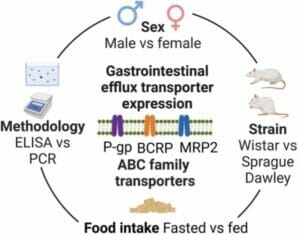- Home
- Mapping clinically relevant efflux transporters between the sexes, strains, and prandial states
- Mapping clinically relevant efflux transporters between the sexes, strains, and prandial states
Preclinical studies
In the reported literature, there is heterogeneity in the choice of preclinical models for investigations into efflux transporters. Therefore, findings from these different models should not be directly compared. Here, we aimed to investigate the influence of the feeding status, sex (male versus female), and strain (Wistar versus Sprague Dawley) of the rat animal model will differently affect the expression of key efflux transporters (P-gp/abcb1a, BCRP/abcg2 and MRP2/abcc2) to different magnitudes.
Our study
Enzyme-linked immunosorbent assay (ELISA) and real-time polymerase chain reaction (PCR) were used to quantify the protein and mRNA intestinal expression of these transporters, respectively. Food, sex, and strain differences were found for P-gp, BCRP, and MRP2 expression for Wistar rats with key differences between the transporters. No sex differences or food effect differences were seen in Sprague Dawley rats for P-gp and BCRP expression. Positive correlation was found between P-gp/abcb1a, BCRP/abcg2, and MRP2/abcc2 expression measured by ELISA and PCR.
Impact on pre-clinical trials
The comprehensive characterisation offered by this study can be used in the extrapolation of preclinical studies to the design of clinical trials and can inputted into physiologically based pharmacokinetic models for early predictions. Food, sex, and strain should be considered in the design of preclinical experiments into efflux transporter expression.

Read our open access research article here.


